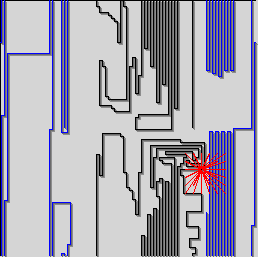
Learning by trial and error
Instead of modelling evolution, on this experiment we imitate the way people solve everyday problems. We use our memory to manage situations we know very well. When faced with a new problem, we try to modify and adapt known solutions from previous experiences.
Here, the Tron player learns by experience, building a database of useful memories. When facing a new situation, it tries to use an applicable solution remembered from a previous game. When no memories are found, a random move is attempted, creating a new, possibly useless, case.
When a problem is solved, all the memories applied become more important. But if the solution fails, the used cases get a negative credit. As games pass, cases with a low score are discarded as useless, whereas useful cases become stronger.
This algorithm creates an interesting machinery for solving by trial and error. The casebase shows, however, a limited adaptation capability. In the end it will become rigid and new problems will never be solved.

Learning by experience: The blue player has needed
more than 200 games to accumulate enough useful
memories to win against Avoider